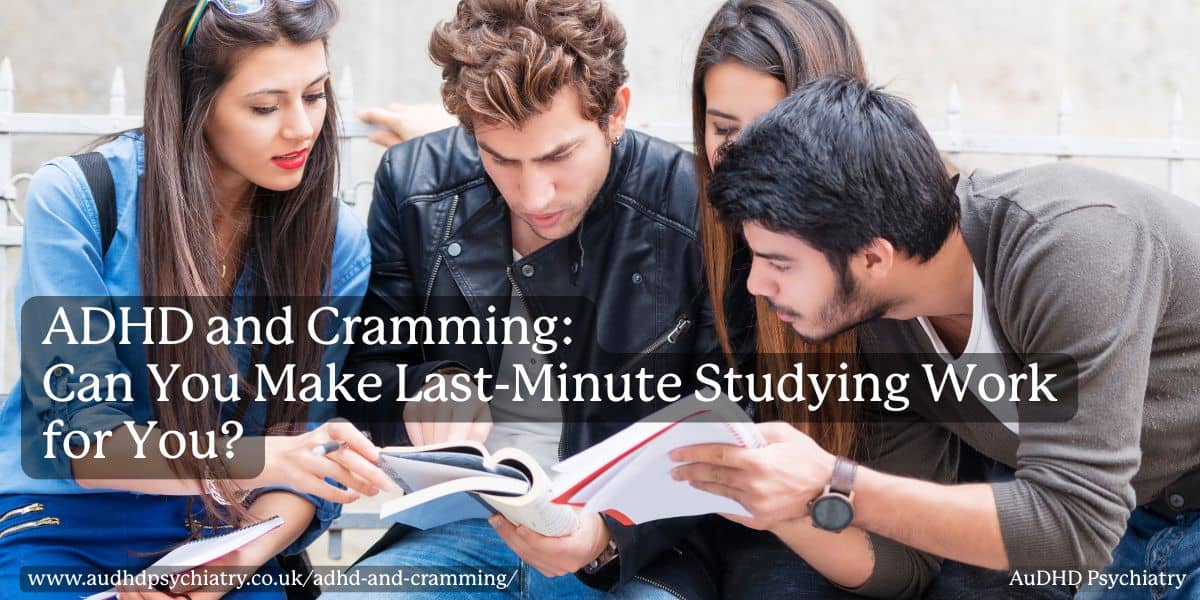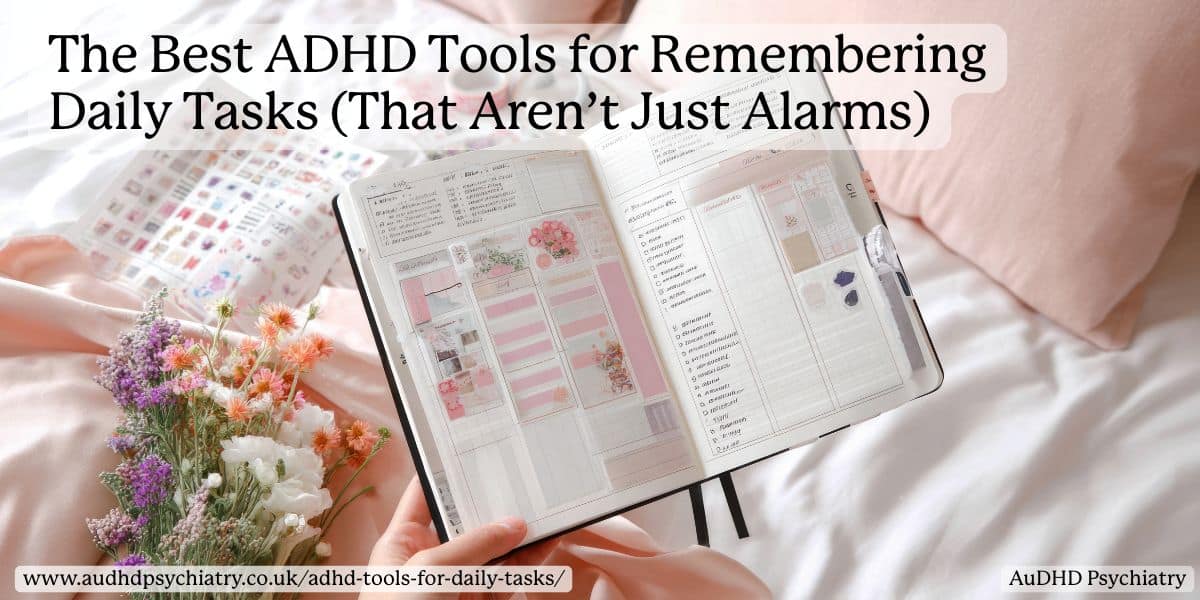
Understanding ADHD and Cramming
Is cramming actually effective for ADHD brains? Cramming is the practice of trying to absorb large amounts of information in a short time before an exam. For many individuals with ADHD, cramming can feel like the only option when focus and organisation have been a struggle throughout the term.
The pressure of an impending deadline provides a burst of urgency, which can temporarily sharpen attention and even trigger hyperfocus. Research shows cramming may deliver short-term recall, but it rarely supports long-term memory or academic success. Students often experience stress, sleep deprivation, and inconsistent results.
Still, when used strategically, last-minute studying can be adapted into manageable chunks that reduce overwhelm and help with exam performance. This article explores the challenges and opportunities of ADHD and cramming, offering practical strategies, revision techniques, and alternatives so you can approach exams and deadlines with confidence.
ADHD and Study Habits
How ADHD Affects Attention, Memory, and Planning
Attention Deficit Hyperactivity Disorder (ADHD) is a neurodevelopmental disorder that impacts how individuals process information and organise tasks. ADHD symptoms such as distractibility, difficulty sustaining focus, and challenges with working memory make it harder to follow traditional study schedules. Common struggles include:
- Forgetting key details soon after studying
- Losing track of materials or deadlines
- Difficulty sustaining attention during long sessions
- Overwhelm when planning large projects
Short-term memory may hold information for a brief period, but transferring it into long-term memory is often disrupted. This can leave students and professionals with ADHD feeling as if they “studied” yet retained little of the material.
Procrastination vs Productive Urgency
Procrastination is common among students with ADHD, but it is not always a sign of laziness. Many individuals delay starting tasks because the work feels too large or because they struggle with time blindness. When the deadline finally approaches, urgency provides an adrenaline boost that sharpens focus.
This can sometimes create productive bursts of concentration, similar to hyperfocus. While this might help during a late-night study session or when finishing a project, it is an unpredictable strategy that may not lead to consistent academic success.
Why Traditional Study Methods Often Fall Short
Traditional learning methods such as long study sessions, silent reading, or rote memorisation are rarely the most effective methods for ADHD students. These study habits often require sustained concentration without breaks, which can increase frustration and reduce retention. Instead, ADHD learners benefit from:
- Active recall (testing yourself instead of rereading)
- Visual learning tools like diagrams or mind maps
- Breaking tasks into small, focused chunks
- Frequent movement breaks to reset attention
- Assistive tools such as noise-cancelling headphones or digital reminders
For ADHD learners, the best way forward usually involves shorter, structured study routines that allow for flexibility and sensory balance.

The Science of Cramming and ADHD Brains
Working Memory and Information Retention
Working memory is instrumental for holding and using information during study sessions. For students with ADHD, limitations in working memory mean that last-minute cramming can quickly overload cognitive capacity. Information may be recalled briefly but often fails to transfer into long-term memory. This is why individuals may feel confident during revision but struggle to retrieve details during exams or presentations.
Dopamine, Stress, and the “Deadline Effect”
Research into ADHD and the brain shows a close link between dopamine regulation and motivation. Deadlines often create a sudden surge of stress and urgency, releasing dopamine that temporarily improves focus. This “deadline effect” explains why cramming can feel effective in the moment.
However, while adrenaline and stress hormones may provide short bursts of productivity, they also increase anxiety, sleep deprivation, and emotional fatigue. Over time, reliance on stress as a study method undermines academic performance and well-being.
Short-Term Gains vs Long-Term Learning Gaps
Cramming can provide quick wins for quizzes or simple memorisation tasks, but it does little for long-term retention or complex subjects. For medical students, professionals in training, or university students preparing for essay-based exams, short-term memory is not enough. Effective study methods such as spaced repetition, active learning strategies, and regular review sessions are far better for embedding knowledge.
Cramming might help pass an immediate hurdle, but it widens learning gaps in the long run, leaving individuals less confident and more stressed in future study situations.
Preparing for a Cram Session with ADHD
When time is short, the first step is deciding what matters most. Students with ADHD often feel overwhelmed when faced with an entire syllabus or project, which makes cramming stressful. Setting specific goals for each study session creates a sense of direction. For example:
- Instead of “revise history,” aim to “review three key events.”
- Replace “study science” with “summarise one chapter.”
- Turn “do essay” into “outline the introduction.”
This keeps focus on smaller, achievable tasks rather than the entire workload.
Structuring Breaks (Pomodoro, body doubling, timers)
Short breaks are crucial for maintaining focus and avoiding burnout. The Pomodoro technique, which alternates 25 minutes of concentrated work with five-minute breaks, is one effective method. For some, body doubling—working alongside a friend, coach, or accountability partner—can also improve productivity.
External timers or apps that send reminders make it easier to track time and reduce the risk of drifting into distractions. These strategies keep study sessions manageable while supporting the executive function skills that are often more challenging for students with ADHD.
Focus-Friendly Studying with ADHD
A structured environment reduces sensory distractions and improves study performance.
Examples of supportive setups include:
- Using noise-cancelling headphones or instrumental music
- Keeping study materials within reach to avoid disruptions
- Turning off unnecessary notifications or websites
- Preparing the study area before starting
By combining structured goals, timed sessions, and supportive environments, cramming becomes less overwhelming and more effective. For more tips and strategies on how to study with ADHD, check out our article: ADHD Study Hacks.
ADHD-Friendly Cramming Strategies That Actually Work

Prioritising High-Yield Topics
Not all material is equally important, especially when time is limited. ADHD students and professionals can benefit from prioritising high-yield topics: the areas most likely to appear on exams or directly impact a deadline. Reviewing summaries, teacher-provided revision guides, or workplace checklists helps identify the key points.
This prevents spending too much time on minor details and ensures the limited study session is spent on the most relevant information. You can also try either a digital or paper planner to ensure you go through your high-priority lessons/tasks in a timely manner.
Using Active Recall and Quick Testing
Active learning strategies such as self-testing are particularly effective for short study sessions. Instead of rereading notes, ask yourself questions or create flashcards. This approach strengthens both short-term and long-term memory by forcing the brain to retrieve information rather than passively reviewing it.
Practice tests and online quizzes are also valuable, as they replicate exam conditions and highlight knowledge gaps. For professionals, rehearsing key points aloud before a presentation or meeting works in a similar way, reinforcing memory through active recall.
Leveraging Visual and Auditory Memory Aids
Many students with ADHD benefit from visual aids such as diagrams, colour-coded notes, or mind maps. These tools turn abstract concepts into something easier to remember. Similarly, auditory learners may find recording notes and replaying them, or listening to instrumental music, improves recall. Study apps that combine visuals with short bursts of practice can be particularly useful.
These techniques allow cramming sessions to be more effective without demanding the long concentration spans that traditional study methods often require. By combining high-yield prioritisation, active recall, and sensory-based strategies, cramming becomes a more structured and productive experience for ADHD learners.
Please keep in mind that a specific strategy that worked for an individual might not work for another. Keep trying out different ways and combine strategies if needed.
Time Management and Study Schedules for ADHD Brains
Breaking Tasks into Micro-Steps
Large tasks often feel unmanageable for students with ADHD, particularly during exam season or work deadlines. Breaking tasks into micro-steps helps reduce overwhelm. Instead of “write essay,” break it down into “outline introduction,” “list three main arguments,” and “draft conclusion.” Each small step creates progress and offers a quick reward, making it easier to keep momentum.
Managing Time Blindness Under Pressure
Time blindness is a common ADHD symptom, making it difficult to judge how much time has passed or how much remains before a deadline. When cramming, this can lead to focusing too long on one section and neglecting others. External tools help track progress:
- Countdown timers or visible clocks
- Alarm-based study blocks
- Colour-coded planners for subjects or projects
Allocating specific time blocks for each subject prevents hyperfocus on just one area.

Digital Tools and Apps That Support ADHD Learners
Technology can be a powerful ally for ADHD students. Apps designed for focus, such as Forest or Study Bunny, combine timers with visual motivation. Digital calendars and task managers can structure study sessions, while note-taking apps provide accessible places to store and review material. Noise-blocking apps or browser extensions that limit access to social media also support focus.
These tools help ADHD learners follow a study routine that balances urgency with structure, reducing stress during last-minute preparation. When combined with micro-steps and better time awareness, digital tools transform cramming into a more strategic and less chaotic process.
Need to see your “cramming schedule” planned out? Here’s how to use ADHD friendly calendars and visual planners.
Smarter Revision Techniques Beyond Last-Minute Cramming
Spaced Repetition and Retrieval Practice for Long-Term Memory
While cramming may deliver short-term recall, the most effective methods for long-term memory are spaced repetition and retrieval practice. These strategies spread study sessions over a longer period, allowing the brain to revisit material multiple times.
Each review strengthens memory traces and improves recall during exam season or professional training. Retrieval practice, or actively testing knowledge rather than rereading notes, also reinforces learning. This is especially valuable for students with ADHD, who may struggle to hold onto information when study is inconsistent. Tools such as flashcard apps or colour-coded revision schedules make spaced repetition easier to manage, even when focus is variable.
Building a Sustainable Study Routine with Consistent Habits
Consistent, short study sessions combined with movement breaks can improve productivity. For example:
- Study for 30 minutes, then take a 5-minute stretch break
- Schedule subjects by day to build predictability
- Keep weekends flexible for review or rest
A routine does not need to be rigid. It can include flexibility for different energy levels and commitments, but regularity helps create predictability, which reduces stress. Over time, these consistent habits provide far more benefit than last-minute cramming.
Why Coaching, Therapy, or Professional Help Can Make a Big Difference
For many individuals, self-directed study methods are not enough. ADHD coaching and therapy can provide structured guidance, accountability, and personalised strategies. Professional help also ensures that academic challenges are not mistaken for laziness, but recognised as part of a neurodevelopmental disorder.
In some cases, ADHD medication plays a role in supporting attention and focus, though this should always be discussed with a clinician. Seeking professional input ensures that study strategies are tailored, effective, and sustainable, making long-term academic and workplace performance more achievable.
The Emotional Side of Cramming for ADHD Students

Stress, Anxiety, and Sleep Deprivation During Exam Time
Cramming often comes at the expense of sleep and mental health. Students with ADHD are particularly vulnerable to stress, as executive function challenges make last-minute study sessions more chaotic. Sleep deprivation further impairs memory, focus, and emotional regulation, creating a cycle of anxiety that makes performance even harder. For professionals, working late into the night to meet deadlines can have similar effects, reducing both productivity and well-being.
Reframing “Bad Habits” and Building Confidence
It is important to reframe cramming not as a personal failure, but as a coping strategy that reflects the unique challenges of ADHD. Many students feel discouraged when traditional study methods do not work for them, which undermines confidence. Recognising that ADHD brains require different study strategies is empowering.
Recognising that your brain works differently allows you to:
- Drop self-blame
- Build study systems that fit your needs
- Focus on progress instead of perfection
This shift can greatly improve motivation and self-esteem.
Supportive Strategies for Mental Health and Resilience
Developing resilience means having tools to manage emotional stress during exams or project deadlines. This might include mindfulness, breathing techniques, or seeking peer support. Practical strategies like scheduling enough sleep, using white noise for calm focus, or adding physical activity can also reduce stress levels.
Accessing professional support from therapists or ADHD coaches provides further emotional scaffolding. By combining self-compassion with practical coping tools, students and professionals with ADHD can reduce the emotional toll of cramming and build long-term confidence.
Support for Students with ADHD Who Struggle to Revise
ADHD Coaching and Academic Support Services
For students and professionals who repeatedly struggle with revision, structured support can be life-changing. ADHD coaching focuses on executive function skills such as time management, planning, and accountability. Academic support services within schools or universities may also offer mentoring, study skills workshops, or one-to-one tutoring designed to meet the needs of ADHD students.
Test-Taking Strategies and Requesting Accommodations
Exams and assessments often present additional challenges for students with ADHD. Requesting accommodations such as extra time, a quiet space, or permission to use noise-cancelling headphones can create a more level playing field. Test-taking strategies, such as reading questions aloud, highlighting key terms, or using practice tests in advance, can also reduce anxiety and improve performance.
When to Seek an ADHD Assessment for Study Difficulties
If study challenges persist despite trying multiple strategies, consider an ADHD assessment. A diagnosis opens doors to:
- Tailored treatment and coaching
- Access to medication (if appropriate)
- Academic or workplace accommodations
For UK residents, AuDHD Psychiatry’s private ADHD assessments can offer timely clarity, helping individuals understand their challenges and begin effective treatment. Recognising when to seek help is an important step in moving beyond cramming and towards sustainable academic and professional success.
ADHD and Exams Beyond School: Study Habits for Life

From High School to University Students and Graduate Students
Study challenges related to ADHD do not end after school exams. High school students often struggle with revision techniques that demand long study sessions. At university, workloads increase, and students are expected to manage study plans independently. For medical students and others in professional training, the stakes are even higher. Effective study habits become essential for academic success, and relying on cramming alone rarely supports long-term memory.
By adopting active learning strategies, spaced repetition, and tailored study routines, ADHD students at every stage can reduce stress and improve performance.
Applying Study Methods to Workplace Deadlines and Group Projects
Cramming does not only apply to academic life. In the workplace, ADHD professionals often face last-minute deadlines, urgent reports, or group projects. The same challenges that appear in study sessions—time blindness, procrastination, and short-term focus—can also affect job performance. Applying structured study methods to work environments is a great way to stay organised.
Using digital planners, setting smaller goals, and practising active recall before presentations are strategies that translate from classrooms to offices. Developing these habits allows individuals to handle projects more effectively and avoid the stress of repeated last-minute efforts.
Executive Function Skills That Carry Into Adulthood
Executive function skills such as planning, prioritising, and sustaining attention are central to both study and work success. Students with ADHD who learn how to manage revision techniques, study schedules, and focus strategies build a foundation that lasts well into adulthood.
These skills not only improve academic performance but also enhance productivity, teamwork, and resilience in professional life. By treating ADHD as a condition that requires tailored strategies rather than forcing traditional learning methods, individuals can thrive in exams, at university, and throughout their careers.
ADHD and Cramming: Conclusion
Cramming may deliver quick wins, but it rarely provides lasting results for students with ADHD or professionals under pressure. The most effective methods combine structured revision techniques, active learning strategies, and consistent study routines that work with ADHD brains rather than against them. With the right strategies and clinical support, you can move beyond last-minute panic and build sustainable study and work habits that improve both performance and well-being.
If cramming feels like your only option, it may be time to explore professional support. At AuDHD Psychiatry, we provide private ADHD assessments and personalised treatment options, including coaching, therapy, and medication management. Book your ADHD assessment today and take the first step towards clarity, confidence, and long-term success.
You Might Also Like
Contact Us
We’re here to answer any questions you might have.
Get in Touch
Opening Hours
Contact Form
We’re here to help. Reach out and we’ll get back to you within 24 hours (Monday – Friday).




Leave a Reply